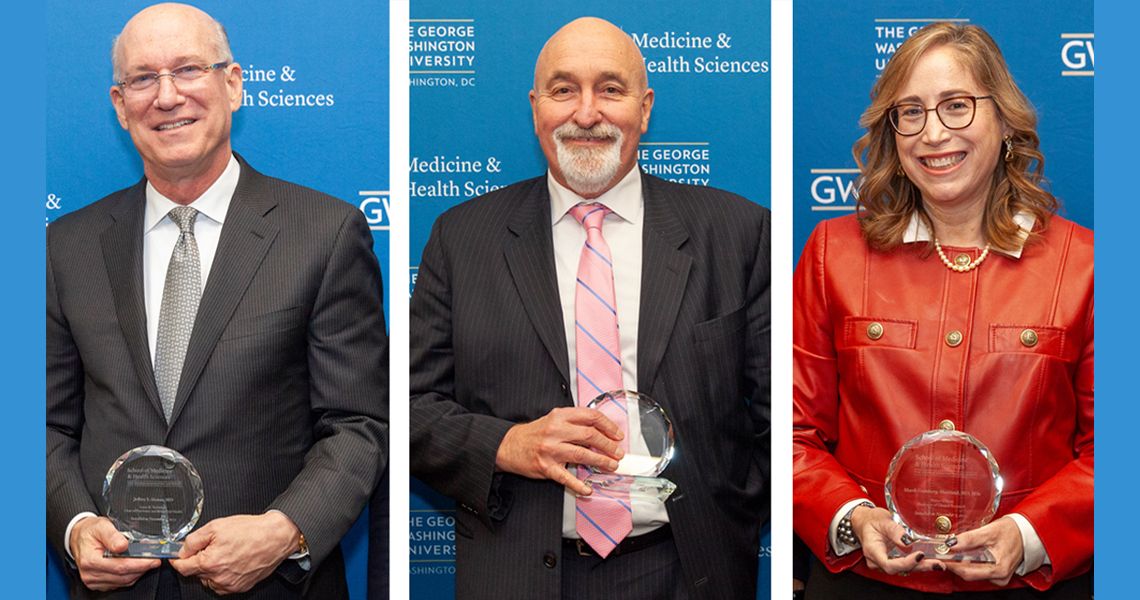From left: Jeffrey S. Akman, John Bethea and Mardi Gomberg-Maitland.
The George Washington University’s School of Medicine and Health Sciences (SMHS) celebrated three prominent faculty members as they were installed as endowed professors on Nov. 1. Jeffrey S. Akman, M.D. ’81, RESD ’85, was named, for a second time, as the Leon M. Yochelson Chair of Psychiatry and Behavioral Health; John Bethea was named as the King Fahd II Chair of Anatomy and Cell Biology; and Mardi Gomberg-Maitland was named as the Walter G. Ross Professor of Clinical Research.
“We look forward to what these faculty members will do next, as they each build upon the foundation of their respective departments or divisions. . . with these important endowed professorships, GW will continue to be a leader in patient-centered care, educational excellence and research,” said Barbara Lee Bass, professor of surgery, vice president for health affairs, dean of SMHS and CEO of the GW Medical Faculty Associates.
The event, noted Provost Christopher Alan Bracey, honored the history of each professorship and the generosity of those who created each professorship, and highlighted the impact of their contributions to medical education, research and health care.
“Each of these endowed professorships supports those who are bold enough to push sciences and education beyond the boundaries of yesterday. We are very proud of our faculty members who are being recognized and we are grateful for the indelible mark that they have made on our academic medical enterprise,” Bracey said.
The ceremony, held at the Convening Center in the Milken Institute School of Public Health, was a testament to SMHS's commitment to scholarship and growth. It brought together faculty and their distinguished guests to express gratitude and recognize those who will continue to advance the missions of SMHS through their endowed positions.
Attendees of the event were moved by compelling stories of how each endowment came about and how they will serve as a catalyst to advancing science, education and patient care. These narratives emphasized the profound and lasting impact of donor contributions, making it clear that these investments are more than just financial—they are investments in human potential and the future of health care.
After recounting the storied history of the Department of Psychiatry and Behavioral Health, including how his endowed professorship was established, Akman, the newly installed Yochelson Chair of the Department of Psychiatry and Behavioral Health, shared that he had received an email and phone call from the son of Leon Yochelson just days before the ceremony. Akman remarked that he “wanted him to know how important philanthropy, and in particular endowed professorships, are in the life of the department and in the life of the academy writ large. And having known every Yochelson professor and every GW psychiatry chair. . .I assured him that each has been extremely proud of serving in the Yochelson chair, me included.”
Akman said that he “was particularly fortunate to be able to serve in this capacity for the second time.”
Bethea, who was recently appointed as the chair of the Department of Anatomy and Cellular Biology, and assumed the role on Oct. 1, was installed as the King Fahd II Professor. Bethea noted that one of the things he is most excited about is the opportunity to bridge neuroscience with the other basic sciences and transform translational science at this institution.
“I really believe by working with members of the department, both research and education faculty as well as faculty in the basic and clinical departments, that we will be able to transform neuroscience and translational science here at George Washington University,” Bethea said.
The third faculty member honored at the event was Gomberg-Maitland, who was installed as the Walter Ross Professor of Clinical Research. Gomberg-Maitland outlined her pathway to becoming not only a great clinician and training under leaders who showed her support but also a clinical trialist. She told the audience about her love of cardiopulmonary systems, how she became a pulmonary hypertension specialist and how her interest in this small sub-specialty was piqued because it was an area that needed clinician-scientists, like her, to develop novel therapies.
Like the others honored at the ceremony, Gomberg-Maitland also recognized those who helped her along the way to becoming installed as the Walter G. Ross Professor of Clinical Research, including her teachers, mentors, colleagues and family members.
Following the ceremony, attendees gathered for a networking reception. The event provided a platform for participants to connect, share their experiences and celebrate the collective commitment to SMHS.
